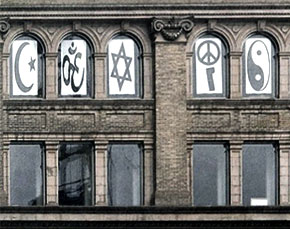BY SAIMA SHAKIL HUSSAIN ON 08 30TH, 2010
Apart from causing millions to become internally displaced, the flood water has exposed the gaping trust deficit that exists both within the country and outside of it. International donors are hesitant, not sure if the funds and goods that they do contribute will end up with those who deserve them. It is difficult to blame them when Pakistanis themselves, rather than depending on the federal or provincial governments to do anything, seem to have devised a sort of ad-hoc adopt-a-village programme whereby private citizens and student groups are gathering goods and delivering them to the victims themselves. Or least to the ones they are able to reach.
And while all this is going on in the homeland, in a far away land, New York City Manhattan
Choosing to downplay the facts that an estimated 60 Muslims also died in the attacks and that there had existed a Muslim prayer hall inside the fallen World Trade Centre, rabid right-wingers have whipped up anti-Muslim sentiment to the extent that even President Obama felt pressured to temper the supporting comments he had made at the annual White House iftaar a day earlier.
The demonisation of Islam has reached such a feverish pitch that American Muslim leaders have become markedly anxious that this year Eid ul-Fitr will fall around September 11. They are concerned that those Americans who are ignorant about Islam – sadly they number very many – will choose to interpret it as a celebration of the anniversary of the 9/11 attacks. Finding the right balance between showing respect for the victims and not giving into fear is the very tough task ahead for America’s Muslim communities.
While contemplating these turbulent times, I could not help but think of the trials faced by the first Muslim community in Madinah. I was especially reminded of the following passage from Martin Lings’ monumental workMuhammad: His Life Based on the Earliest Sources (1983) which gives a detailed account of the incredible odds that faced the small and impoverished band of believers who struggled to build a new life while also defending themselves against their many enemies:
“Before the Prophet (peace be upon him) set out [for the Battle of Khaybar], one of the men of Awas known as Abu Abs came to him with a problem. He had a camel to ride, but his clothes were in rags and he had no means for procuring any provisions to take on the march and nothing to leave for the upkeep of his family, let alone buying himself a new garment. There were many others in similar circumstances, though this was an extreme case. But much had been spent on the Pilgrimage, and everything that had been gained so far in the way of spoil was outweighed by the increasing number of poverty-stricken converts who came to Madinah from every direction.
The Prophet gave Abu Abs a fine long cloak, all that was available for the moment; but on the march, a day or two later, he noticed that he had on a much poorer cloak and he asked him: ‘Where is the cloak I gave thee?’ ‘I sold it for eight dirhams said Abu Abs. ‘Then I bought two dirhams worth of dates as provision for myself, ad I left two dirhams from my family to live on, and bought a cloak for four dirhams.’ The Prophet laughed and said: ‘O father of Abs, thou and thy companions are poor indeed. But by Him in whose hand is my soul, if ye keep safe and live yet a little while, ye shall have abundance of provisions and leave abundantly for your families. Ye shall abound in dirhams and in slaves; and it will not be good for you!’”
Dr Martin Lings (1909-2005), or Abu Bakr Siraj Uddin as he was also known, earned acclaim throughout the Muslim world for his book which was proclaimed to be the ‘best biography of the prophet in English’ at the National Seerat Conference in Islamabad.
Combining simplicity with grandeur, he has narrated events from the Prophet’s life that are familiar to many, but what make his telling of them stand apart are the Arabic sources of the eighth and ninth centuries – Ibn Ishaq, Ibn Sa’ad and Al-Waqidi – whom he has quoted extensively.
Thus from the men and women who heard the Prophet speak and witnessed for themselves the events of his life the reader learns of the monumental challenges he and his followers faced time and again. In a society that was staunchly tribal and allegiance to lineage was deeply entrenched, they emigrated from their ancestral homeland – something had never been imagined before – and laid the foundations of an egalitarian society in a peaceful oasis.
That our society today is neither peaceful nor egalitarian while a sizable number ‘abound in dirhams’ bears witness to the prophecy which was made so long ago.
Saima Shakil Hussain is the editor of Dawn’s ‘Books & Authors’ magazine.
Saima Shakil Hussain is the editor of Dawn’s ‘Books & Authors’ magazine.



No comments:
Post a Comment